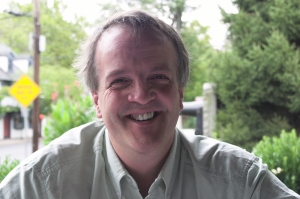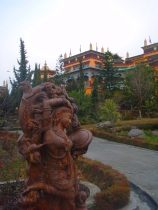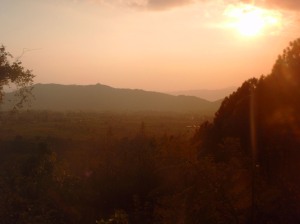I have always loved travelling. Recently, however, my wanderlust has been particularly strong. Since 2009, my international travels have included the Bahamas, India twice (Delhi, Agra, Jaipur, Shekhawati, Dharamsala, and Bir), Scotland (Edinburgh, Loch Lomond), the Netherlands, Spain (Madrid, Valencia, Barcelona), Italy, France, England (London, Rye, Kent, Wadhurst), Austria (Vienna, Salzburg), and the Dominican Republic. In less than 2 weeks I graduate, and two days afterwards I will be off again- starting in London and then most likely heading to Greece (Mykonos or Kos), Morocco (Fez), and the Czech Republic (Prague).
Whew. Considering I’ve done all that while being a full-time student and also holding jobs, that’s not too shabby.
Most people want to travel, I don’t think I’m any different in that respect. The difference is that with me it’s a borderline compulsion. I find a way to do it even if it means not buying groceries or textbooks or selling half my possessions on Ebay.
Why? Good question. I have had many conversations with many people about why I have a constant need to travel. I think a large part of it is that I feel as though I am a citizen of the world, not any one place. I don’t necessarily identify with any one culture, though there are some that I prefer to immerse myself in over others. I love to see how humans in different locations have built unique societies and have such diverse ways of life- I find it astonishing that one species can develop such different cultures based on their geographic locations. I also love seeing the natural world and all it has to offer.
Is there a deeper reason for my waywardness? Some say I’m running from something, others think I’m chasing it. I honestly don’t know. I’ve always wanted to travel and the only thing holding me back was lack of means. My mum will tell you that as soon as I got a job and had a car, I was never home. I don’t often feel a pull to any specific place, it’s more that I’m constantly fighting some sort of force that’s trying to pick me up and bring me somewhere, anywhere.
Regardless of whether or not I’m fleeing or chasing, I still find travelling extremely neccessary. I think it’s important to be aware of other cultures, other people’s perceptions of the world, and just the phenomenal gift that is life. Think about it, though: self-awareness. What a concept. We are all a part of something greater, there is some sort of force that holds us here. Self-awareness isn’t just awareness of your own being, but also everyone else’s and how we’re all intertwined. There’s a sense of unity that I find when I’m outside of my comfort zone, whether it’s sitting in an airport for 15 hours watching all the people in transit or whether it’s walking ancient ruins that were build thousands of years ago by humans just like us. It makes me realise that deep down, we are all struggling with the same human issues and enjoying the same human pleasures- some things transcend culture and geography.
So maybe I am running from something. Maybe I am chasing something that I’ll never find. Regardless, I’m enjoying the trip!









